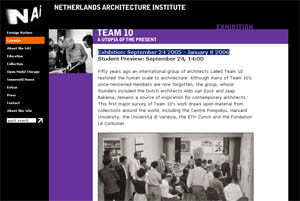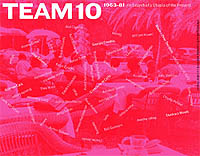Exhibition: September 24 2005 - January 8 2006
at the Netherlands Architecture Institute (NAi), Rotterdam
IN SEARCH OF A UTOPIA OF THE PRESENT
The Team 10 research project
Initially, the Team 10 research project was an initiative of Max Risselada
(TU Delft), Jos Bosman (TU Eindhoven), Kirstin Feireiss (then director NAi)
and Bernard Colenbrander (then curator NAi). It took several years to develop
the project and trace and disclose most of the scattered archives. Thanks to
the support of Hans Beunderman, dean of the Faculty of Architecture, and Aaron
Betsky, director NAi, and Rein van der Lugt, head of exhibitions NAi, the initiative
has finally come to a first fruition in 2005, resulting in the exhibition (curators
Suzanne Mulder and Max Risselada) and publication (editors Max Risselada and
Dirk van den Heuvel).
The initiative for the Team 10 project is part of long standing research, undertaken
by the chair of Architecture and Housing at TU Delft, Faculty of Architecture.
This research programme involves the revaluation of the tradition of Modern
Architecture. One of its main premises is the notion that the issues of modernization
and the way these affect our cities and environment are still central to the
further development of the architectural discipline.
It should be noted there exists a special relation between Team 10 and the Delft
Faculty of Architecture. Both Jaap Bakema and Aldo van Eyck were highly influential
professors at the school, Bakema from 1964 until his death in 1981, and Van
Eyck from 1966-1984; their fellow Forum editor, Herman Hertzberger, should also
be mentioned here, he was a professor at Delft from 1970 until 1999. After Bakema's
death Alison and Peter Smithson took over his chair for two years. Among its
outcomes was the production of Alison Smithson' s booklet 'AS in DS' (1983)
by Otto Das, as well as the production of 'Team 10 Meetings' (1991) by Max Risselada.
Hence, Team 10 ideas were widely spread among Delft alumni, and they still form
a crucial part of the Delft legacy.
At the same time, at TU Delft Team 10 ideas and people were also target for
fierce criticism in the 1970s; this criticism was of diverse character, but
in hindsight the attacks of the neo-marxist tendency seemed to have been dominant
calling for a much more radical political and ideological stance than the established
generation of Team 10 was taking then. The post-modernist upheaval never really
touched the Delft discourse, although it was informed by it. The neo-marxist
tendency would introduce the ideas of the Italian Tendenza group to Holland,
and at the same time start a re-investigation into the tradition of Modern Architecture.
It is in this sense, that Team 10 would remain a constituent part of this particular
trajectory, too.
A final remark - apparently, until now it was not possible to come to a first
reconstruction of the Team 10 history. One of the sad sides of this is the fact
that no one of the core group of Team 10 is alive any more. Still, this may
bring up the question with some more urgency, whether the Team 10 legacy still
suits us.
Dirk van den Heuvel
![]() Team 10 A Utopia of the Present
Team 10 A Utopia of the Present
Exhibition: September 24 2005 - January 8 2006
at the Netherlands Architecture Institute (NAi),
Rotterdam

The exhibition 'Team 10 - A Utopia of the Present' concentrates on the core
members of Team 10: Jaap Bakema and Aldo van Eyck (from the Netherlands), Giancarlo
De Carlo (Italy), Georges Candilis and Shadrach Woods (France), and Alison and
Peter Smithson (England). This core group was the most active in organizing
the meetings and disseminating the ideas that were discussed there. The exhibition
covers the period from 1953 - the year that the future Team 10 architects caused
a stir with their presentations at the 9th CIAM congress - to 1981, when, after
Jaap Bakema's death, the group stopped organizing meetings.
This exhibition - curated by Suzanne Mulder (NAi) and Max Risselada (TU Delft)
- shows how Team 10's efforts resulted in a number of important innovations
in Modern Architecture and urban planning. 'A Utopia of the Present' denotes
the field of tension between idealism and realism in which the ideas of Team
10 were conceived. The utopian ideals of Team 10 stood in contrast to an almost
radical realism: Team 10 participants believed that Utopia could only be realized
through actually building. The projects by Team 10 are therefore also realistic
responses to the actual building tasks of the period.
More on the NAi
website, including the special Team
10 in Pictures and Sound.
Team 10 1953 - 1981
In Search of A Utopia of the Present

Max Risselada and Dirk van den Heuvel (eds), Max Risselada, Dirk van den Heuvel,
Jos Bosman, Christine Boyer, Tom Avermaete, Zeynep Celik, Ben Highmore, Kenneth
Frampton, Francis Strauven, Luca Molinari, Giovanni Damiani, Clelia Tuscano
et al.
Published by: NAi Publishers,
Rotterdam 2005
Design: Jaap van Triest, Illustrated (colour and b/w),
Hardback, 368 pages, Format: 24 x 31 cm,
English edition, ISBN 90-5662-471-7, € 69.50
The book presents the work of Team 10 from three perspectives. It offers an abundantly illustrated chronological survey of Team 10 meetings, events, project documentation and other keys to the Team 10 discourse. The interpretative second section contains essays by leading scholars about the origins and the position of Team 10 in the history of architecture, describing cross-overs with visual and non-western cultures, and also shedding light on architectural and urbanist approaches that were formulated in response to the problems of post-war modernity. The final section of this publication is a series of interviews with former Team 10 members, providing a unique portrait of the group and its meetings between 1953 and 1981.
order this book at NAI Booksellers